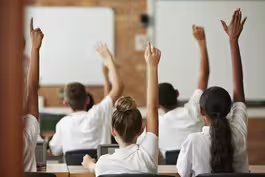
How climate crisis is changing family planning in Bangladesh
Clip: 6/29/2024 | 6m 16sVideo has Closed Captions
How the climate crisis is changing family planning and reproductive health in Bangladesh
Few places in the world are suffering more from the effects of climate change than Bangladesh. Most of the country is no higher than 50 feet above sea level, making it vulnerable to severe flooding after monsoon rains. As a result, women in Bangladesh are changing the way they think about having children. John Yang speaks with Sally Dijkerman, a senior researcher for Ipas, to learn more.
Problems playing video? | Closed Captioning Feedback
Problems playing video? | Closed Captioning Feedback
Major corporate funding for the PBS News Hour is provided by BDO, BNSF, Consumer Cellular, American Cruise Lines, and Raymond James. Funding for the PBS NewsHour Weekend is provided by...

How climate crisis is changing family planning in Bangladesh
Clip: 6/29/2024 | 6m 16sVideo has Closed Captions
Few places in the world are suffering more from the effects of climate change than Bangladesh. Most of the country is no higher than 50 feet above sea level, making it vulnerable to severe flooding after monsoon rains. As a result, women in Bangladesh are changing the way they think about having children. John Yang speaks with Sally Dijkerman, a senior researcher for Ipas, to learn more.
Problems playing video? | Closed Captioning Feedback
How to Watch PBS News Hour
PBS News Hour is available to stream on pbs.org and the free PBS App, available on iPhone, Apple TV, Android TV, Android smartphones, Amazon Fire TV, Amazon Fire Tablet, Roku, Samsung Smart TV, and Vizio.
Providing Support for PBS.org
Learn Moreabout PBS online sponsorshipJOHN YANG: Few places in the world are suffering more from the effects of climate change than Bangladesh.
Most of the country which is slightly smaller than Iowa, is a flat plane no higher than about 50 feet above sea level.
That makes it vulnerable to the sort of severe flooding that's now affecting more than 2 million people after weeks of monsoon rains.
And now there's another effect.
Women are changing the way they think about having children.
Sally Dijkerman is a senior researcher for Ipas, which is a reproductive justice organization.
Sally explain to us how these effects of climate change are affecting women's health and Bangladesh and especially women's reproductive health.
SALLY DIJKERMAN, Senior Researcher, Ipas: Yeah, thank you for that question.
So what we found in our research along the Bay of Bengal and these communities that have been really hit hard by cyclones, is that the climate crisis is impacting everyone but certain groups, especially women and girls, are feeling those impacts disproportionately and that includes direct impacts on their and reproductive health outcomes for instance experiencing miscarriage, pregnancy complications and premature labor during these intense storms and flooding.
A lot of women have to go to the cyclone centers where they shelter during the storms.
And there's not nurses and doctors, medical supplies or even sanitation materials for those women who do go into labor, which is quite common.
And so they have to give birth in these unsanitary conditions without a healthcare professional present.
JOHN YANG: And how is this affecting their decisions to have children?
SALLY DIJKERMAN: Yeah, so women are facing, you know, the difficulty of having to evacuate and putting their families before their own health and well-being.
So for instance, women traditionally are the caregivers in this context.
So they have to make sure that their children and elderly people and people with disabilities in their community evacuate first, which means sometimes they are the last ones to be thinking about their own safety.
And so what they see is that other pregnant women are going or are experiencing prematurity, pregnancy complications, stillbirth and miscarriage during these cyclones.
And it's scary for them.
And so they think, well, you know, I'm not ready to have a child when there's so much instability and these extreme weather events happening.
But then there's also the other side of that, where one woman even talked in our research even talked about how she wanted to have more children to protect against potential childlessness.
In the case of her child being killed during one of these storms, because children are also very vulnerable during evacuation.
JOHN YANG: Has there been a marked difference in child mortality?
SALLY DIJKERMAN: So child mortality linked directly to these storms is something that's still being researched.
You know, the point here really is that women and girls, including youth, are feeling those impacts disproportionately to other people in the community.
And so it really is causing them to reconsider when they have children, and how many they how many children they have.
JOHN YANG: What other effects are there of these, these effects of climate change how they're affecting life in Bangladesh?
SALLY DIJKERMAN: So in in Bangladesh, and in all nine countries where we've done this research, we're finding direct links between the conditions caused by the climate crisis and increases in child marriage.
So when the climate change undermines the economic sectors like agriculture, there's increased economic instability and crisis in these families.
And so women told me that child marriage marrying off one's daughters is being used as a coping mechanism, both to receive additional money from dowry payments, and also to have less one less mouths to feed.
JOHN YANG: And is there also a connection or an effect with violence against women?
SALLY DIJKERMAN: Yeah, so violence is increasing for two reasons.
First, this economic instability causes so much stress in the family, and that leads to more intimate partner violence.
But also women and especially young girls talked about how in cyclone centers in Bangladesh, where they're sheltering from storms, there is really poor security, poor lighting, and lack of separate spaces and toilets for men and women.
And so these toilets, and these spaces are a hotbed for sexual harassment and violence.
And so young girls told us that they hold their urine for hours on end because they're afraid of using the bathroom at the recycling centers.
And that leads to a lot of problems and pain.
JOHN YANG: Are Bangladeshi women responding in some way or the organizing, making demands or calling for changes?
SALLY DIJKERMAN: Yeah, so in our research, women talked about a few things that they want, and there are getting involved in helping their communities adapt to the climate crisis, and helping them for instance, be part of these disaster risk management committees so they can feel prepared and ready to evacuate in a safe and timely manner.
But women are asking for decent work opportunities, access to sexual and reproductive health services in these cyclone centers and outside of them.
And these are just two things that women are demanding.
JOHN YANG: As the globe warms as the temperatures around the world are rising.
Do you think these this situation we're going to see replicated in more and more places around the world?
SALLY DIJKERMAN: Yes, absolutely.
I mean, extreme heat is extremely dangerous.
Exposure to extreme heat is very dangerous for pregnant women.
And that is something that we're seeing across the globe, whether you're in Bangladesh, Mozambique, Indonesia, or in Texas.
This exposure to extreme heat for pregnant women has been linked to miscarriage stillbirth low birth weight and prematurity.
JOHN YANG: Sally Dijkerman of Ipas Thank you very much.
SALLY DIJKERMAN: Thank you.
The debate over public funding for religious schools
Video has Closed Captions
Clip: 6/29/2024 | 8m 16s | Key points in the debate over public funding for religious schools (8m 16s)
How gun violence outside of schools harms millions of kids
Video has Closed Captions
Clip: 6/29/2024 | 6m 18s | Frequent gun violence near school grounds harms millions of kids, analysis finds (6m 18s)
Providing Support for PBS.org
Learn Moreabout PBS online sponsorship
- News and Public Affairs

FRONTLINE is investigative journalism that questions, explains and changes our world.

- News and Public Affairs

Amanpour and Company features conversations with leaders and decision makers.












Support for PBS provided by:
Major corporate funding for the PBS News Hour is provided by BDO, BNSF, Consumer Cellular, American Cruise Lines, and Raymond James. Funding for the PBS NewsHour Weekend is provided by...

